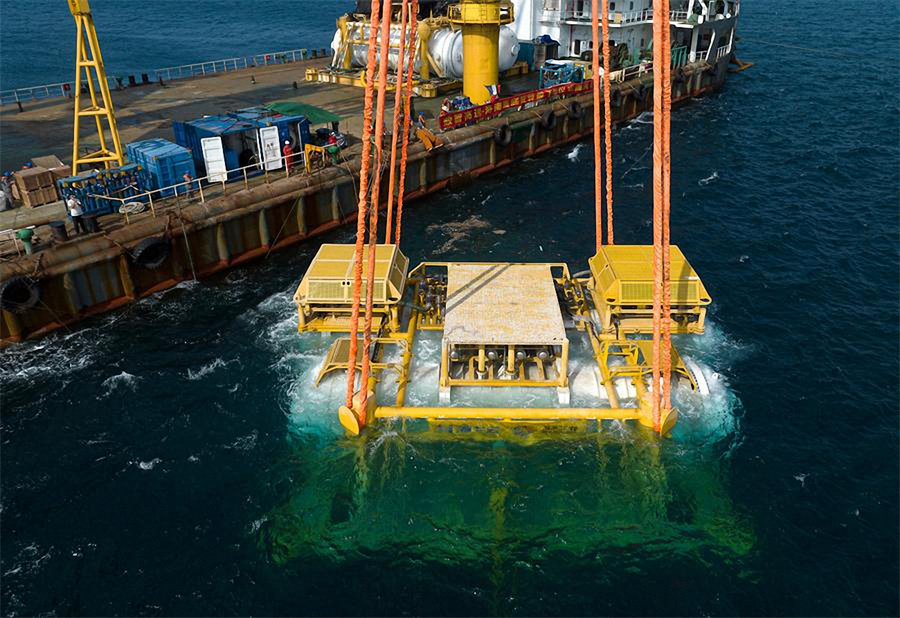
From the depths of the ocean to the edge of space, Hainan province is boldly carving out new frontiers and transforming its natural advantages into engines of high-tech growth.
As a white, 18-meter-long cylindrical structure slowly descended into the sea off the coast of Lingshui Li autonomous county in Hainan this spring, the underwater intelligent computing pod connected with an existing subsea data center, marking the official launch of the world's first underwater intelligent computing cluster for commercial use.
"This pod forms part of the Hainan underwater intelligent computing center," said Pu Ding, general manager of the Hainan underwater data center demonstration project. "Each pod can house over 400 high-performance servers, and through a nearby land-based station, they bridge data to end-users."
Intelligent computing centers are specialized infrastructures designed for artificial intelligence and big data processing. They offer powerful computational capacity to support the training and deployment of large AI models while handling massive volumes of data.
By shifting server clusters underwater, Hainan has created a green, low-carbon alternative to traditional land-based data centers. The underwater systems are cooled naturally by the seawater, significantly reducing energy consumption, Pu said.
"The cluster's computational power is equivalent to about 30,000 high-end gaming PCs operating simultaneously," Pu said. "It can complete in one second what an average computer would take a year to process, and supports up to 7,000 AI interactions per second based on DeepSeek's model."
Pu added that based on a reference power allocation of 1 megawatt, each underwater intelligent computing pod can deliver up to 1,400 PFlops of computing power, a 40 percent increase in efficiency compared to land-based centers.
The advantages extend beyond efficiency. The pods also operate in a stable, oxygen-free marine environment, which reduces corrosion and system failures, the manager said. The setup is also designed to integrate with offshore wind farms, transforming ocean energy into clean computing power.
Pu noted that to date, the underwater computing cluster has already signed agreements with nearly 10 companies. The applications range from training and inference for large AI models to industrial simulation, game development, and marine science research — sectors poised to benefit from such concentrated computing power.
Hainan's pursuit of innovation doesn't stop at the ocean floor.
At Wenchang International Aerospace City, towering launchpads rise above the coastal palms, poised to meet the growing demand for commercial space launches both at home and around the world.
"In the next three to five years, we expect a high-density launch period for China's commercial aerospace sector," said Guo Qiang, a senior executive at Hainan International Commercial Aerospace Launch Co Ltd in the city. "To meet this demand, we're scaling up both our launchpad capabilities and overall support infrastructure."
Guo added that the company's two launchpads are already operational, with turnaround times of just three days between launches and a one-week recovery period, enabling high-frequency, high-efficiency operations.
Wenchang's coastal location also offers a vital advantage for safe launch and easy retrieval, he added, as reusable rocket technology is now a major challenge for commercial aerospace development.
According to the aerospace city's administration bureau, three successful launches have already taken place this year. Construction on the No 3 and No 4 commercial launchpads is underway, with a goal of executing over 50 launches annually by 2027.
"The plan is not only to accelerate the commercial aerospace supply chain, but also to bring aerospace tourism to life," said Xiao Lin, deputy director of the administration bureau. Key projects under planning include a space-themed park and themed hotels, all part of an effort to make Wenchang a "space tourism hub of China", Xiao said.
As the country deepens its openness to the world, Xiao added, Wenchang is positioning itself as a globally oriented commercial spaceport.
"Foreign investment is expected to play an expanding role across satellite manufacturing, research and development and production in the near future," he said.
According to the bureau's data, by the end of February, more than 700 space-related enterprises had already set up operations in Wenchang, including 26 satellite industry cluster companies now accelerating their development.

